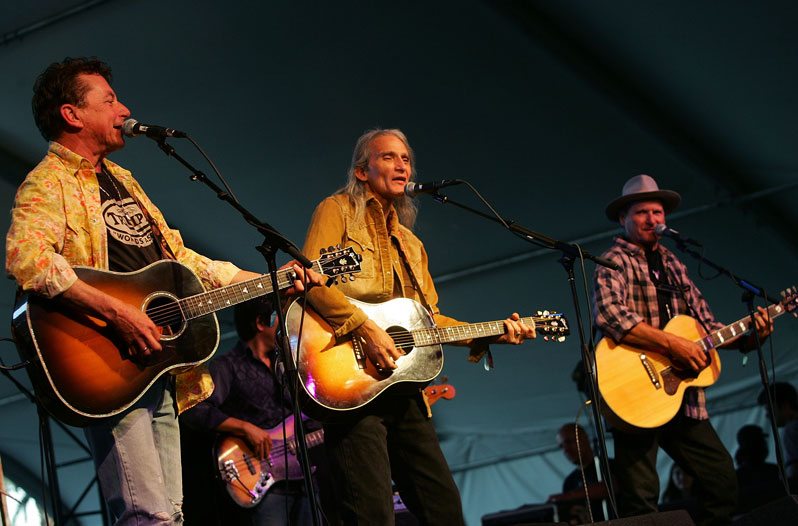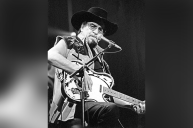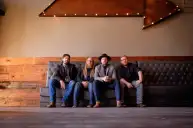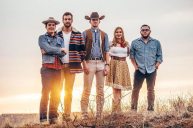[dropcap]F[/dropcap]or decades now, The Panhandle of Texas has been at the forefront of country, folk and Americana music. The dusty cities of Lubbock and Amarillo have become cultural hubs for the region since earnest farmers and ranchers began settling the land centuries ago.
Like much of the nation, The Panhandle was raised on the two-stepping days of Western Swing, American folk storytelling and the humble picking of country blues. While Western Swing King Bob Wills settled down in Tulsa and Fort Worth, he kept his roots in the small town of Turkey, Texas. Before venturing out of the Dust Bowl, Woody Guthrie would spend years of his youth in Pampa, Texas. They would serve as two foundational pieces for Lubbock and Amarillo's budding music scenes.
It's a desolate land that can be unbearable at times. The vast flatness and seas of cotton fields can make you feel imprisoned by the land and boundless sky. Lubbock and Amarillo feel far from anything that's even remotely close to being cool and high brow culture. That distance makes The Panhandle its own unique ecosystem. Musicians say there are only two things to do in Lubbock - play music and go crazy. Sometimes, they do both.
There's undoubtedly a love-hate relationship with many of The Panhandle's favorite sons and daughters. This tension has spawned a no-holds-barred mentality to songwriting and musicianship. With their ears to the ground, Panhandle songwriters have chronicled life and events on the South Plains with genuine and honest bearings. There's a reckless energy that emerges from this tight-knit group of individuals.
Still, there are some redeemable aspects to the Flatlands. There an enduring beauty buried down deep in the dry land dirt and the relentless wind that whirls it around, often sandblasting anything in its way. Make no mistake, in West Texas and the far reaches of the frontier, it's still Mother Nature's dominion. To say the least, it's humbling.
All of these factors culminate into a distinct take on country and folk. It's often as loud and progressive as it is gentle and intimate. From country megastars and rock & roll founders to outsider art visionaries and dust bowl storytellers, here are 15 of Panhandle Music's pioneering voices.
Buddy Holly
https://youtu.be/AyTtFNGzFsE
Buddy Holly is undoubtedly Lubbock's most famous son. The early rock & roll pioneer was a harbinger for change in the late '50s on the South Plains. Raised on the likes of Western Swing and country, Holly's life would change after opening for Elvis Presley at Lubbock's Cotton Club. Soon after, Holly would begin combining those early country influences with rockabilly, R&B and early rock. Though he only released three albums before his tragic death, Holly's legacy would live on with a back catalog of recorded material and a host of friends - Bob Montgomery, Sonny Curtis, Sonny West, Buddy Knox, Waylon Jennings and several others - who would continue striving to match Holly's visionary ideals.
Essential Listening: "Not Fade Away," "True Love Ways," "That'll Be the Day"
Waylon Jennings
With his large baritone voice, Waylon Jennings could silence a room just as easily as he could make it erupt with cheers and the clanking of beer bottles. The Littlefield native first started out in Lubbock as a local radio DJ and bass player for Holly. It would be years after Holly's death before Jennings would come back to country music, where he'd be on the forefront of the Outlaw country music. With a bevy of honky-tonk classics, Jennings often provided the yin to Willie Nelson's yang. Jennings hardened grit and prototypical four-piece lineup, a noticeable shift from Western swing's big band days, would mark a change in country music that would be felt for years, especially around the Panhandle.
Essential Listening: "Bob Wills is Still the King," "I've Always Been Crazy," "Lonesome, On'ry and Mean"
Mac Davis
https://youtu.be/qv0LOTnH_Cw
With one broad stroke, Lubbock's Mac Davis expressed everyone's thoughts about Lubbock in the form of "Texas In My Rear View Mirror." The love-hate relationship with Lubbock and the Panhandle is often the catalyst for songwriters and musicians from the area. Davis' pop sensibilities, charm and tongue-in-cheek humor would shed a light on Lubbock unseen since the days of Holly.
Essential Listening: "Texas In My Rear View Mirror," "It's Hard to Be Humble," "Baby Don't Get Hooked on Me"
Terry Allen
Terry Allen is Lubbock's quintessential renaissance man. For more than 50 years, Allen's collection of sculptures, plays, paintings and albums have captured life around The Panhandle and Texas at large. In 1979, Allen delivered Panhandle Music's greatest album, a sprawling 21-track double-platter album titled Lubbock (on Everything). Much like an onion, Allen would peel back layer upon layer of musical history, culture and social hierarchy on the South Plains. People often cite Lubbock as a pivotal point in West Texas music history, where music sounds distinctly different before and after its release.
Essential Listening: "Amarillo Highway," "There Oughta Be a Law Against Sunny Southern California," "Flatland Farmer"
Joe Ely
https://youtu.be/68jEBq-HTDU
In the 1970s, Joe Ely would pick up where Holly had left off decades before. Along with songwriters Jimmie Dale Gilmore and Butch Hancock, Ely would form the legendary shortlived band The Flatlanders. As a solo artist, Ely often built his rocking country sound off of the edgy guitar play of Jesse "Guitar" Taylor and storied saxophonist and Rolling Stones collaborator, Bobby Keys. Ely's live performances were often bustling with energy and swagger. Ely has settled nicely into a storytelling folk artist with homages to the Southwest and South Plains.
Essential Listening: "Fools Fall in Love," "Me and Billy The Kid," "Honky Tonk Masquerade"
Jimmie Dale Gilmore
Jimmie Dale Gilmore's warbling vocals were often the catalyst in The Flatlanders' brand of country folk. There's a warmth to Gilmore's delivery that feels right at home on honky-tonk tear starters and campfire poetry with its high and lonesome drawl. Often called a cosmic cowboy, Gilmore's best songs float along in the big West Texas sky. There's something eternal and spiritual in Gilmore's quiet and quaint country balladry.
Essential Listening: "Dallas," "Mack the Knife," "Tonight I Think I'm Gonna Go Downtown"
Butch Hancock
If Ely was the rocker and Gilmore was the cosmic cowboy of The Flatlanders, Butch Hancock was the rock that rooted them down into Panhandle storytelling. Hancock, a true Woody Guthrie disciple, provided a lengthy catalog of country folk tunes that Ely and Gilmore would often record on their solo albums. There's an earthy texture to Hancock's songs that feel aged and worn. There's a comfort and humble glow to them. Hancock's discography is perhaps the most essential to understanding Panhandle music.
Essential Listening: "If You Were a Blue Bird," "West Texas Waltz," "Diamond Hill"
The Maines Brothers Band
After years of backing Ely, Allen and others through the'70s, The Maines Brothers Band stepped out on their own with a vengeance in the '80s. Often, they'd dive deep into Allen's catalog of Panhandle storytellers and give it a progressive country edge. The result was a combination of an energetic rock show while staying true to the traditional dancehall bands they were raised on around Lubbock. In the late '80s, The Maines would call it quits. It wasn't long thereafter though that pedal steel guitarist Lloyd Maines would move down to Austin and become a principle voice in the early days of Texas Country.
Essential Listening: "Texas Tears," "New Delhi Freight Train," "Break the Fall"
Delbert McClinton
While Ely went off into rocking country punk territory, Delbert McClinton would dive down into the world of Texas blues. The Lubbock native would make his way through the bar scene of Dallas and Fort Worth in his early years where he became a noted harmonica player. He even taught John Lennon the finer points on playing the instrument. With his working man attitude, McClinton would pave a lane with his gritty blues numbers and soulful honky-tonkers.
Essential Listening: "Two More Bottles of Wine," "Victim of Life's Circumstances," "The Jealous Kind"
Jay Boy Adams
Despite only releasing two albums in the late '70s, Jay Boy Adams would provide a soundtrack of light and airy folk songs for the South Plains. Much like Amarillo's JD Souther, Adams was heavily influenced by Los Angeles' country-rock scene of Jackson Browne and the Eagles. With his folky delivery and an ear for vibrant harmonies, Adams' brand of gentle, cool country would serve as a nice alternative to Lubbock's often rocking roar of the era.
Essential Listening: "The Legend of Jack Diamond," "Fork in the Road," "Life in a Small Town"
Tommy X Hancock
Tommy X Hancock may not be as familiar a name as some of his contemporaries today, but he's often revered as "The Godfather of West Texas Music" for a reason. During his early days, Hancock lead western swing band The Roadside Playboys and owned Lubbock's Cotton Club, where the Roadside Playboys served as the house band. Much like The Armadillo World Headquarters down in Austin, Hancock's Cotton Club was the epicenter for Lubbock music during the '60s and '70s and served as a place where the cowboys and hippies could interact and mingle. It was here where Hancock's Supernatural Family Band, a blend of counter-culture folk and country storytelling, was formed.
Essential Listening: "I Should Have Married Marie," "Cattletruck Driving Boogie," "Tacos For Two"
Gary P. Nunn
Before releasing his own solo material, Gary P. Nunn was part of Jerry Jeff Walker's mythical backing band, The Lost Gonzo Band. With fellow Lubbockite Bob Livingston on bass, The Lost Gonzo Band would usher in a new progressive era in country music in Texas. As a solo artist, Nunn built on that iconic sound with his own twists of old-school country twang for good measure. His "London Homesick Blues" may have been Austin City Limits theme song for years, but the road-weary anthem remains a Panhandle staple.
Essential Listening: "London Homesick Blues," "The Last Thing I Needed, the First Thing This Morning," "What I Like About Texas"
Pat Green
With Pat Green, it's fairly simple. Many of Lubbock's modern-day singer-songwriters wouldn't be around without Pat Green. The Texas Tech University graduate first began putting himself on the map by playing small bars in and around Lubbock in the '90s. Taking his cues from Robert Earl Keen and Steve Earle, Green would establish a new brand of songwriter based on college bar scenes and stories. His first few albums, produced by Lloyd Maines, have since become legendary. Green is known for his easygoing attitude and lyrics that seesaw between humble confessions and comfortable weekend drinking songs.
Essential Listening: "Take Me Out to a Dancehall," "Texas On My Mind," "Carry On"
Cory Morrow
In those early days of Texas Country, Green's partner in crime was typically fellow Texas Tech alum, Cory Morrow. Like Green, Morrow cut his teeth while bouncing around Broadway in Lubbock during his college days. Perhaps both their best efforts came in the form of Songs We Wish We'd Written, a collaboration album filled with covers by the likes of Waylon Jennings, Darrell Scott and John Prine. Their cover of "Texas On My Mind" by Django Walker, Jerry Jeff's song, is still one of the most iconic songs in Texas Country music history.
Essential Listening: "Lonesome," "21 Days," "Lead Me On"
Cooder Graw
Much like The Maines Brothers Band some 20 years before them, Amarillo's Cooder Graw brought in a wave of rocking progressive country back into Panhandle music. Matt Martindale's anthemic choruses would be brought to life by a band raised on rock & roll of the '90s. A fixture at Amarillo's Golden Light, Cooder Graw would find state-wide success with their aggressive loud country that relied heavily on two-stepping numbers and cerebral odes to the Panhandle.
Essential Listening: "State Line," "Llano Estacado," "Shifting Gears"




